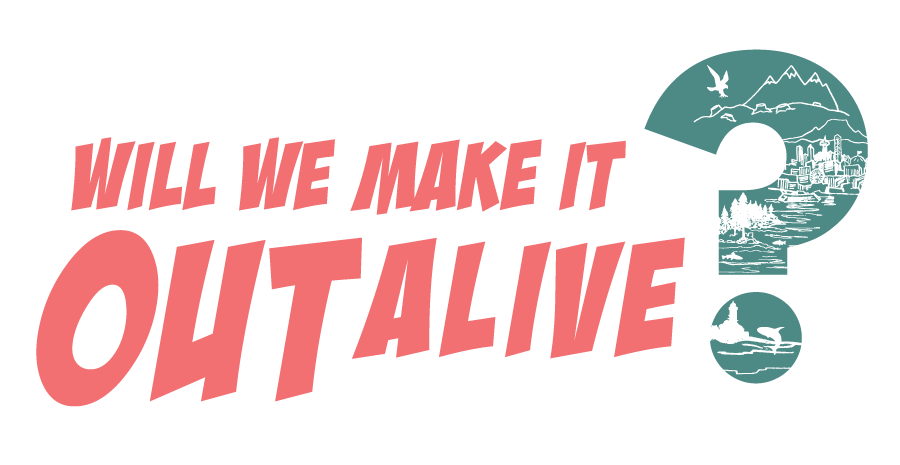Episode 10: Keeping Your Head Above Water
/How does she bike in that dress?
Before we begin, tomorrow, June 5th is World Environment Day! This year’s theme is Beat Air Pollution, and some things you can do to celebrate include planting trees, cleaning up trash, or biking to work.
Actual picture of us kayaking in the urine water from our story!
To begin the episode, the Poop Detective tells another Thailand story; this time about kayaking in our own urine! We don’t recommend, but we didn’t get sick and had fun.
In our restoration segment, the Poop Detective tells us why it’s bad to swim in urine and poop (and other pollution). Some of these reasons include viruses, pathogens and parasites.
“It’s okay for me to vomit into the water though, because that’s just from motion sickness and not from any nasty bugs.”
Whack Fact: These can get in the water a multitude of ways, but one way I hadn’t thought of was from a sick person vomiting or pooping into the water!
“I actually support that!”
If you do get sick at the beach, you can self-report your illness on the surfrider crowdsource webpage, sick at the beach. They describe it as, “A Crowd-Sourced Collection of Self-Reported Beach Pollution Sicknesses.”
Other ways to stay healthy at the beach include leaving the beach and public access sites cleaner than you found them, and reporting spills. If you see something spilled in the water or at a Washington beach contact the Department of Ecology’s Spill Response line for investigation and follow-up at 1-800-OILS-911 (https://ecology.wa.gov/About-us/Get-involved/Report-an-environmental-issue/Report-a-spill).
You can also check local monitoring program websites before you head out to make sure the beach is safe for swimming (at least for those beaches that have funding for monitoring). This includes statewide monitoring Beach Monitoring Programs in Washington and Oregon. Even British Columbia has some beach monitoring programs mostly focused in the Greater Vancouver and Victoria areas. Most swimming related monitoring programs in the Pacific Northwest are focused on sampling between Memorial Day to Labor Day
The Poop Detective then tells us about the BEACH Act and related programs. These beach monitoring programs each produce a proposed list of monitoring locations and the public is invited to provide input on the selection of monitoring sites, biannually.
You can maintain contact with the Washington Beach Program through their blog, fecal matters (Amy is upset someone beat her to this title) or on their social media sites. Find out about the health of beaches in your area through their interactive map.
The Oregon Beach Monitoring Program monitors waters along its coastline. In Oregon, the public is guaranteed free and uninterrupted use of all beaches along the coastline; therefore, beach advisories are issued but closings are not. They do not have an interactive map, so you have to figure out where the beaches are on your own. What’s up, Oregon??? The Magical Mapper is disappointed in you.
Surfrider also has a volunteer beach monitoring program called the Blue Water Task Force. They provide beach monitoring throughout the US and provide an interactive map.
There are some local jurisdictions, like King County,which also have local river or lake monitoring programs. Check your local government website to see if they have monitoring program results available.
The Poop Detective then makes us sad while warning us of the dangers of freshwater harmful algal blooms, which can be toxic to humans and pets.
Both Washington and Oregon have limited Freshwater Toxic Algae monitoring programs, which include health advisories for some water bodies.
Also find out which beaches The Poop Detective and The Magical Mapper think are #sleg!
Speaking of beaches, the Washington Department of Ecology is running a campaign this summer for people to share photos and videos of the Washington Coast and Puget Sound on Twitter with the hashtag #WAbeaches and the location. They’ll be sharing them throughout the summer. Share no matter what the weather!
In the GIS section, the Magical Mapper gets some style (files)! Head over to the GIS Tools blog for more.
In our final segment, the Magical Mapper lets you know about Clean Marinas, which is a voluntary eco-certification program. There are programs in several US states as well as in British Columbia and around the globe.
Gig Harbor Marina & Boatyard is the latest in Washington to receive Clean Marina certification, on October 11, 2018. Way to go, Gig Harbor!
There are a lot of benefits to becoming a clean marina, including cleaner water and reduced costs! If you don’t own or operate a marina you can help your local marina get certified (unless they already are, in which case you should support them). If you’re in Washington or Oregon, or even in British Columbia, local program websites have all sorts of helpful information.
Thanks for joining us, and here are a few extra links just for fun!
Fun Beach trivia game from National Geographic
Beach Facts
More Beach Facts
Cat Fact 1
Cat Fact 2



